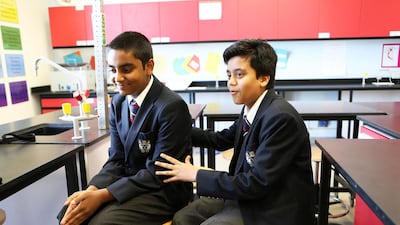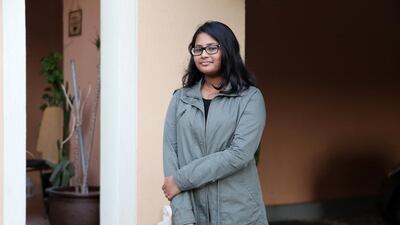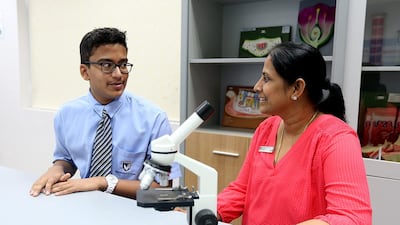The final five projects for the Genes in Space competition have been announced. Meet the finalists:
1. Zakaria Rahman and Nikhil Potula
Having recently arrived from Manchester in September, Zakaria was a quiet and soft-spoken boy according to Guy Schooley, a physical education teacher at Brighton College in Al Ain.
With only three days to go before the submission deadline, Zak and his classmate Nikhil Potula took up Mr Schooley’s challenge and worked round the clock to come up with their winning experiment idea.
After learning about the resilience of the tardigrade, a water-dwelling organism that is able to survive in the vacuum of space for at least 10 days, the team decided to focus on experiments to see if the creature’s properties could be transferred to human genomes to aid long-term space travel.
Nikhil, who first became interested in the sciences through his father who is a medical doctor, said he was ecstatic when he first heard they were finalists.
After winning their school a mini-PCR machine, Mr Schooley says Zak is now more confident at school.
2. Haneefah Badar
Haneefah Badar, a year 10 pupil at Brighton College Abu Dhabi, said her father - a medical doctor - was the inspiration behind her interest in the sciences and was therefore the natural choice for guidance.
After refining her proposal during most weekends over the last six months at home with her father, Haneefah came up with the idea of studying increased cell death as the possible cause for astronauts’ loss of bone density while in space.
Haneefah’s father said the novelty of her idea and its practical implications for increasing the health of astronauts on long-term space journeys most likely won the contests’ judges over.
“Looking at the past winners in the US I didn’t think I would get this far but now am really excited about working with people from universities I dream of going to,” she said.
3. Akio Shirali, Matteo Sottocornola, Wilson Huijsmans
A friendship which started in a high school library more than a year ago has transformed into a winning union that has taken one of the five final spots in the Genes in Space competition.
Three Cranleigh Abu Dhabi pupils - Matteo Sottocornola, Wilson Huijsmans and Akio Shirali – teamed up to create an experiment idea they hope will help astronauts produce their own medicines in space.
With only three weeks to prepare their proposal they began meeting at each others houses to work into the early morning hours.
Their experiment idea proposes editing the genes of certain fungi so they can increase the rate of proteins it produces to create antibiotics, such as penicillin, in space.
“It’s an amazing opportunity to receive the mini-PCR machine for our school and have access to professors from Harvard and MIT. We learned a lot already but I’m sure that will be taken further,” said Matteo.
4. Karun Isaac
When Karun Isaac, 14, came across the Genes In Space contest, the shy but ambitious youngster knew he wanted to be involved.
“I like genetics and the idea of genetic modification and thought this would be a possible career for me in the future,” said the Year 9 pupil whose love of the sciences stemmed from his father, an engineer by trade, speaking to him about physics
Karun’s interest in genetic modification led to him presenting an experiment idea which would investigate the cause of neurodegeneration through cosmic radiation in space on molecular level.
The hands on experience of using the mini-PCR machine while attending a Genes in Space seminar in the capital in August was key to helping Karun formulate his idea.
Karun said he now knows he has to work hard to compete against four other great experiment ideas, but he is more motivated then ever before.
5. Alia Al Mansoori
An Emirati pupil inspired by her older siblings working in science-related fields said being a Genes in Space finalist would help her achieve her dream of following in their footsteps.
Alia Al Mansoori - whose research led to her the topic of gene mutation, the possibility of conditions in space leading to it, and the ways it could be prevented - said she had plenty of resources at home when preparing her proposal.
Her experiment idea proposes the study of heat shock proteins – proteins produced by cells in response to exposure to stressful conditions – in a microgravity environment to see if they can aid in the prevention of mutation.
When Alia found out her submission had been selected amongst the top five she said her achievement would help her classmates broaden their outlook on the possibilities of future careers.
“Hearing about this competition through me will get them thinking outside the box and relate sciences to different majors,” she said, adding she felt she was one step closer to achieving something big.
tsubaihi@thenational.ae





